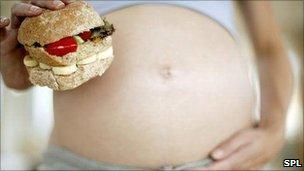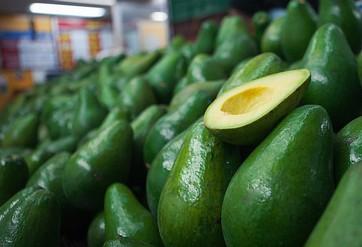"I'm not fat, I'm pregnant!" Actually, some women may be both but there are currently no UK guidelines to help midwives and women define how much is too much when it comes to weight gain during pregnancy.
In this week's Scrubbing Up, Bridget Benelam from the British Nutrition Foundation says there needs to be clear advice on weight control for pregnant women.
Nearly half of women of childbearing age are overweight or obese in the UK and this means there are increasing numbers of obese pregnant women. But spotting those mothers whose bumps are due to fat as well as baby is difficult, not least because there are no UK guidelines on how much weight women should gain during pregnancy.
Pregnancy weight gain varies and depends on many things - including the weight of the baby, the amount of amniotic fluid and the mother's increased blood volume - as well as body fat. Some additional fat is stored during pregnancy to provide a reserve for breast feeding when the baby is born.
But excessive weight gain during pregnancy carries health risks for the mother and child. It also makes the delivery of the baby more difficult, with caesarean sections and forceps deliveries more common. All this puts a strain on an already stretched maternity service.
Despite the common idea that women need to "eat for two" when pregnant, there is actually only a small number of extra calories needed in pregnancy.
No extra calories are needed during the first 28 weeks of pregnancy and only an extra 200kcal per day are required during the last 12 weeks, the equivalent of two small slices of bread.
In a survey of over 6,000 women carried out by the Royal College of Midwives and NetMums last year, 61% said their midwife did not have enough time to discuss their concerns about weight management and nutrition, meaning many women may embark on pregnancy without having discussed how to manage their weight at this important time.
And whilst there is a clear need for readily available advice, guidance is lacking.
Current recommendations in England from NICE (National Institute for health and Clinical Excellence ) do not address the issue of how much weight gain is healthy in pregnancy. Indeed, they flag up the need for UK-specific guidance.
These guidelines, issued in 2010, do say that women who are overweight or obese should be encouraged to lose weight before trying for a baby.
However, they say once a woman is pregnant, she should not be encouraged to diet to lose weight as this may harm the health of the growing baby and so women should follow a healthy diet and be physically active.
But what does this mean in practice?
In the US, guidelines go further.
The Institute of Medicine sets out what is a healthy weight gain - 25 to 35 pounds (11.5 to 16kg) during pregnancy for women at a normal weight for their height.
And it says overweight and obese women should gain less weight during pregnancy than lean women. For example, no more than 20 pounds (9kg) for the most obese.
Pregnancy is a window of opportunity where women are particularly interested in looking after their health and that of their growing baby.
Getting the right help and advice about weight control to pregnant women (and those planning a pregnancy) could help to reduce the risks to both mums and their babies, and also help mitigate the strain that obesity in pregnancy puts on the health service.
But midwives need support in delivering this advice on weight control, something they may never have been trained to provide. Arming them with clear guidance would be a good place to start.










